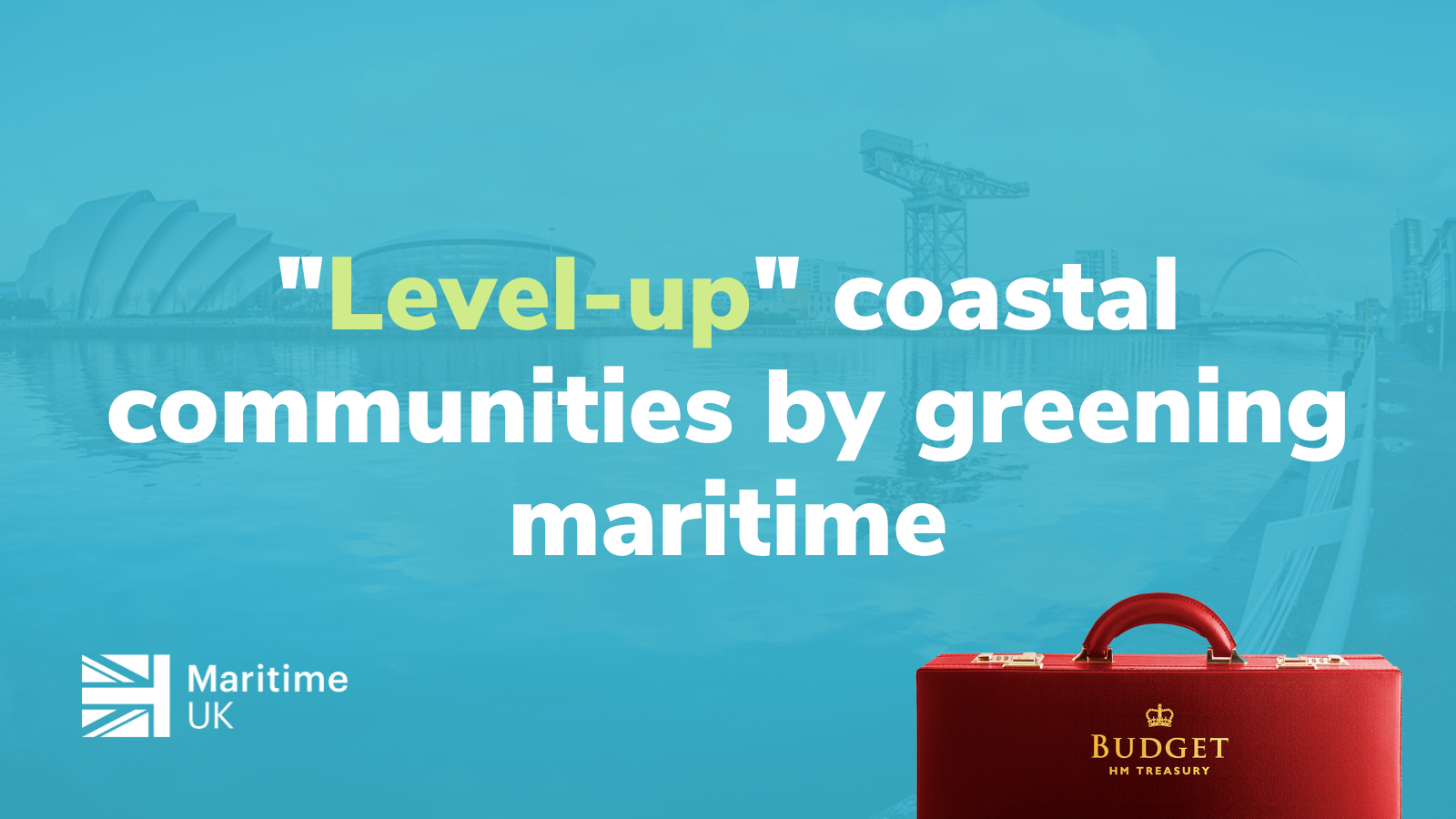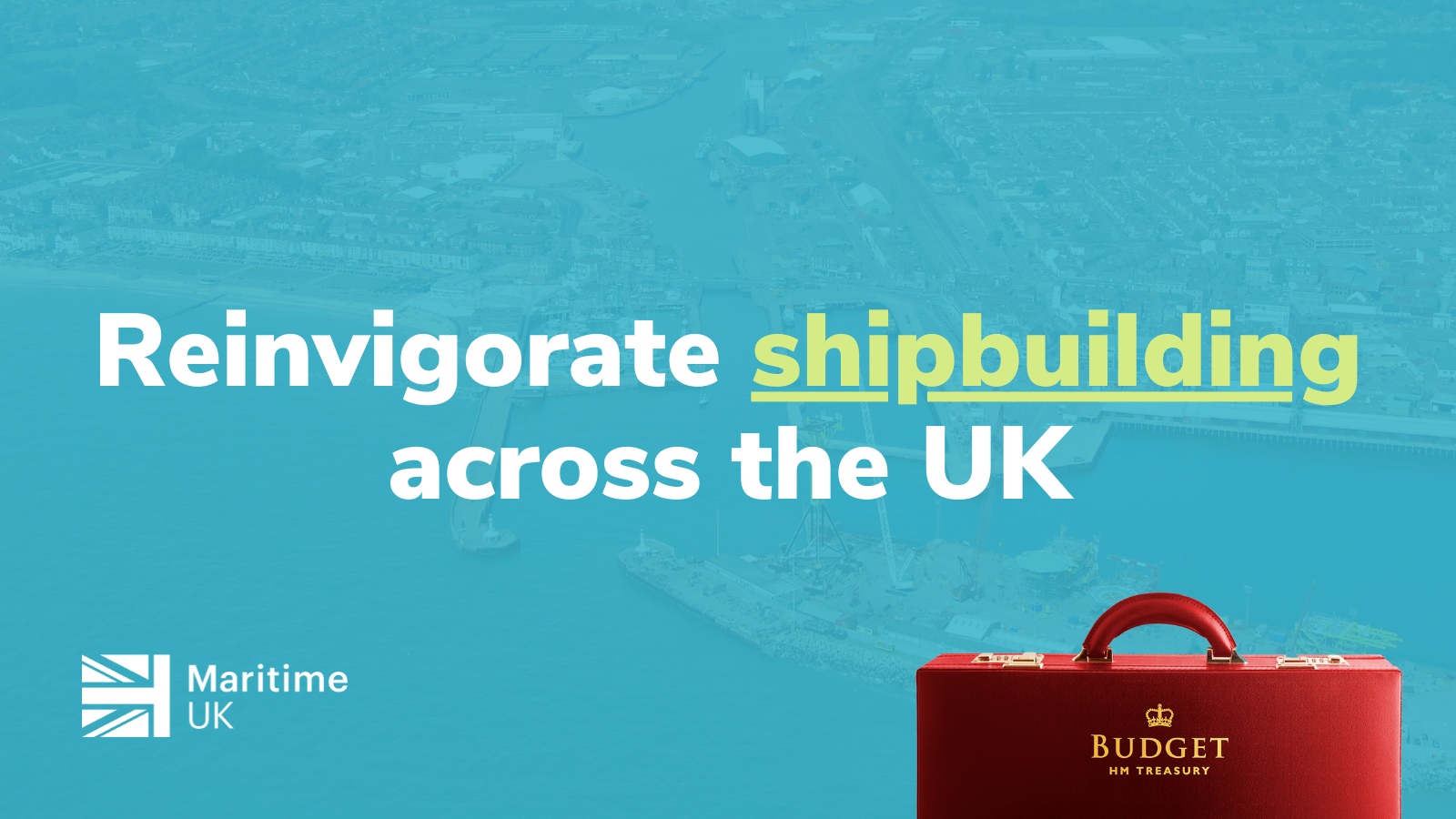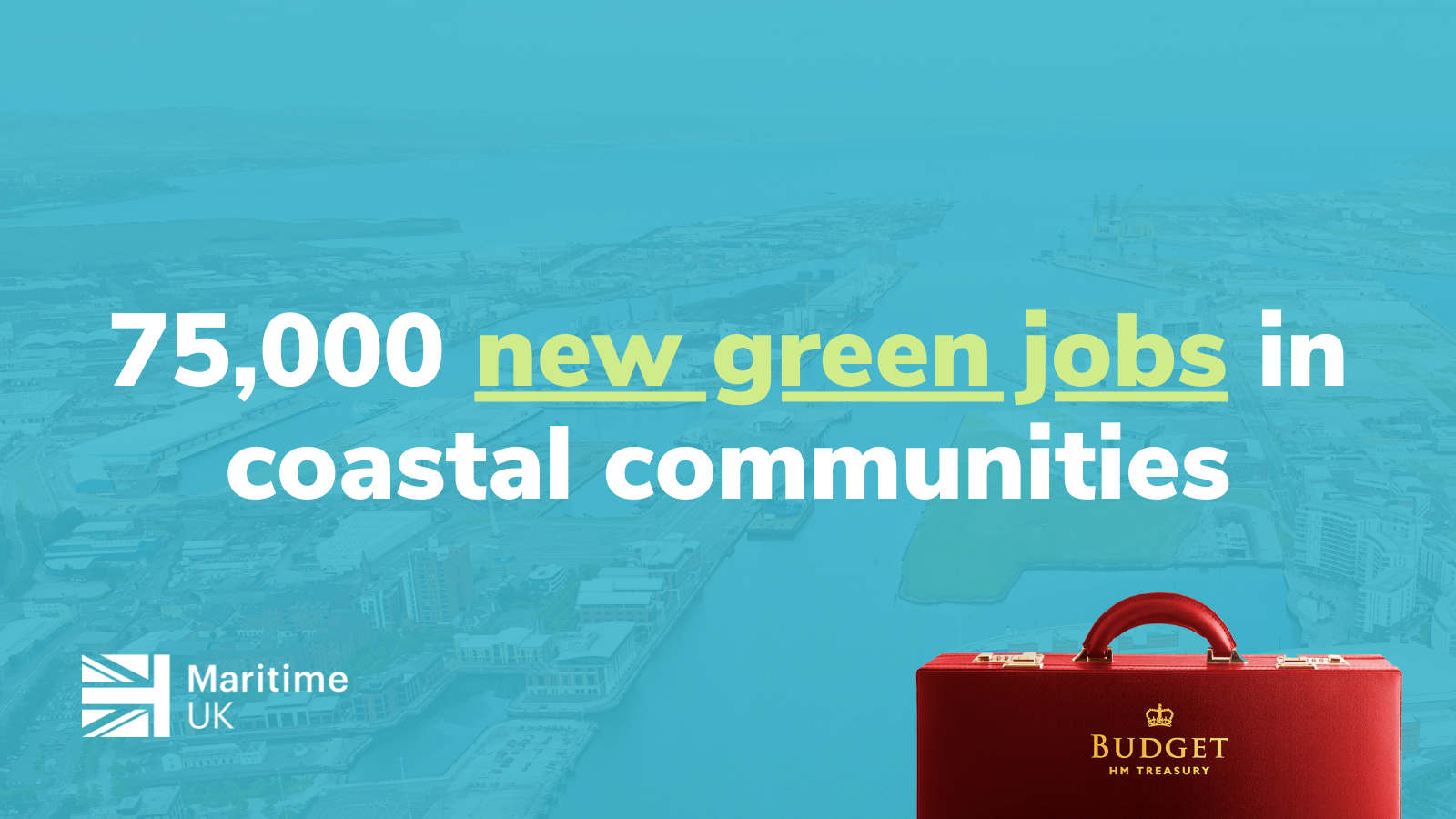For Industry
Background
The Government is expected to publish a Comprehensive Spending Review (CSR) in the Autumn. The CSR, which is led by the Chancellor, will be significant to Maritime UK members because key priorities and projects must receive government investment in order to ensure the UK’s position as one of the world’s leading maritime nations, and one that can meet its Net Zero legal obligations through the next decade.
Maritime UK has been working collaboratively and successfully with the Department for Transport to shape their bid in terms of maritime, and to ensure that the Treasury recognise the key role that maritime companies have played during the COVID-crisis, as well as our ability to support economic growth across the country as part of a Green Recovery.
Additionally, we want to build on the progress we’ve made over the last year, specifically the Clean Maritime Demonstration Competition (CMDC) announced as part of the Prime Minister’s Ten Point Plan for a Green Industrial Revolution, and the establishment of UK-SHORE through the Department for Transport’s Transport Decarbonisation Plan.
To support this, we are looking to mobilise maritime-friendly MPs to encourage them to advocate strongly for our industry in the Commons, and in private with ministers, as well as through the upcoming Parliamentary Debate on maritime (date TBC).
We are therefore curating a dedicated campaign of political advocacy ahead of the Spending Review, and we are asking for members help and participation in this.
This toolkit has been created by Maritime UK to support members to engage with your local MPs and to secure their advocacy for the UK maritime sector ahead of the CSR.
We appreciate that, for some bodies and companies, political engagement is not an activity you regularly undertake. Other members however do a lot of this sort of communications activity. The document is therefore designed to make this activity as easy and efficient as possible for you to carry out, whatever your experience in political engagement. The document includes:
- Guidance on how to find out who your local MPs are, and how to contact them
- A template email to begin your engagement with them
- A graphic to post on your social media
To complement the activity being undertaken by members, Maritime UK will be engaging extensively with MPs, Peers, and council leaders to support them to apply positive pressure on the Government to deliver an ambitious funding package for the maritime industry.
Current political context
- Climate change is the greatest challenge of our times. Transport is the largest emitting sector of greenhouse gases (GHG) in the UK, and within transport, maritime emissions are significant: UK domestic shipping emits more GHGs than buses and rail combined .
- Without intervention, domestic shipping emissions will continue to rise . Intervention is needed now, as the lifespan of vessels (approx. 30 years) means that fleet renewal must start now to achieve Net Zero by 2050 in maritime.
- The UK is falling behind other maritime nations both in terms of propulsion technologies and green infrastructure. Despite being included in flagship government policy documents, such as the Prime Minister’s Ten Point Plan, the sector is not getting the support it needs. As an example, construction, quarrying and mining, recently received a dedicated diesel to hydrogen transition fund in H2 strategy.
- Targets have been made more challenging as international shipping emissions have been included as part of the UK’s national emissions targets for the first time. The UK’s sixth Carbon Budget will incorporate the UK’s share of international aviation and shipping emissions, bringing the UK more than three-quarters of the way to Net Zero by 2050.
- The maritime sector is bearing significant costs – as an example, ports start to pay £40 million of extra fuel taxes from April having not received exemptions given to other sectors, and without support to enable transition to greener fuels or technologies.
- The Prime Minister’s Ten Point Plan provided £20 million for a Clean Maritime Demonstration Competition (CMDC). This limited one-year springboard is funding feasibility studies and technology trials in clean maritime technologies, laying the foundation for a network of real-world projects.
- This competition has been massively oversubscribed and has unlocked significant private investment, showing the world-class capabilities and appetite to invest of our clean maritime supply chain. Maritime UK is seeking to build on the recognition gained with the CMDC to urgently accelerate the sector’s transition to Net Zero.
- The Government has announced its plan to publish this year a refreshed National Shipbuilding Strategy – with a primary focus on green shipbuilding. The transition to Net Zero represents a crucial opportunity for a radical reboot of our maritime industries, relaunching the sector by placing the UK at the forefront of the design and development of zero emission vessels.
- Reinvigorating shipbuilding hotspots across all parts of the UK will create new jobs and opportunities, showing the strength of the Union and driving growth in coastal economies.
- In July, the Department for Transport published its Transport Decarbonisation Plan. Whilst not providing any new funding to support maritime decarbonisation, the plan enshrines the proposal to explore establishing a UK Shipping Office for Reducing Emissions (or UK-SHORE) into Government policy.
- UK-SHORE was the vehicle proposed in last year’s Maritime UK spending review bid to coordinate and disperse new funding to support sector decarbonisation. The UK-SHORE brand name is now in the public domain, and this bid is designed to translate that policy ambition into reality, building on the success of the CMDC and programmes like OZEV. The vehicle should support the roll out of green infrastructure as well as investment in new propulsion technologies.
- The maritime sector has made a significant contribution to the UK’s COVID response. We have kept supply chains open, ensuring access to vital resource across the country including food, fuel, and medicines.
- We are now looking to develop greater resilience, create jobs and boost economic growth across the UK’s coastal communities, showing the strength of the Union and building back better after COVID.
- In March, the Chancellor announced first Freeports in England, with seven focused in coastal areas.
- Alongside his Ten Point plan, the Prime Minister announced an Offshore Wind Manufacturing Investment Support Scheme to further develop offshore wind manufacturing facilities at ports. This scheme was massively oversubscribed and only supported two locations (Humber and Teesside).
- A Backbench Business Debate has been secured on the future of the maritime sector.
Key maritime stats
- Maritime contributes £46.1 billion to the UK economy and supports 1 million jobs (more than air and rail combined).
- Maritime is responsible for keeping the country supplied (resilience): 95 percent of British imports and exports in goods are moved by sea, including 25 percent of the UK’s energy supply and 48 percent of food supplies. Investment is essential for maintaining these resilient supply chains that every constituent relies upon.
- Ports invest over £600 million of private capital each year, benefiting coastal economies through job creation and infrastructure investment.
- Maritime workers are 43% more productive than UK average.
- Maritime is a source of well-paid highly skilled roles, which pay an average of £38,000 per year - £9,000 more than the national average.
- Globally, the maritime sector will double to $3trn by 2030, with the market for maritime emission reduction technologies reaching $15 billion per year by 2050, resulting in economic benefits to the UK of $690 million per year.
- Maritime makes a significant contribution to all nations and regions of the United Kingdom.
- $1.4-1.9 trillion will be needed to decarbonise the global maritime industry.
Our Autumn Spending Review bid is designed to build upon the Clean Maritime Demonstration Competition to accelerate the sector’s decarbonisation:
- Sustain and create high-skilled, well-paid, green jobs: 1.1m jobs are generated by the UK maritime sector, and investment at the CSR will unlock a wave of green jobs to help the sector decarbonise as well as ensuring a just transition from jobs reliant on carbon industries to low and zero carbon.
- No country has yet completely pulled ahead in the zero-emission maritime race but there are fierce competitors, like Norway, aiming to access emerging clean maritime markets. Since last year’s SR, other countries have moved further ahead.
- The UK has the skills and manufacturing potential to become a global leader - let’s act fast to secure maximum jobs and economic growth potential.
- The CMDC demonstrated the capability and appetite to invest of UK industry. The CMDC was oversubscribed, receiving bids for 225% of the available budget for an initial total proposed investment of £70m. We now need to scale this up.
- Drive economic development in coastal communities: Growth in the UK maritime sector will unlock significant growth in areas that are essential for the Government’s ‘levelling-up’ agenda.
- Investment in infrastructure will strengthen local economic recovery, building back greener.
- The bid is centred on plans to replicate the success of the UK’s automotive industry in driving its decarbonisation journey. It therefore replicates in the maritime sector the Office for Zero Emission Vehicles and demonstration competitions, through a government and industry partnership worth £1bn to accelerate the UK’s maritime decarbonisation programme and tackle climate change.
We propose an urgent partnership to build back greener, with industry prepared to co-invest as it has done through the CMDC.
We estimate that UK-SHORE will:
- Directly create 15,200 jobs and a further 58,400 jobs throughout the supply chain (73,600 total), according to the Centre for Economics and Business Research.
- Create jobs in all four nations of the United Kingdom, particularly in coastal communities with a tradition of maritime economic activity, including shipbuilding.
- Relaunch our marine industries by placing the UK at the forefront of the UK design and development of zero emission vessels.
- Reinvigorate shipbuilding hotspots across all parts of the UK will create new jobs and opportunities, showing the strength of the Union.
- Set the UK on a course to meet its legal net-zero maritime obligations.
- Position the UK as the world-leader in maritime decarbonisation and help transform the UK into a scientific superpower, by taking advantage of the fast-growing market for clean maritime technologies and fuels.
- Build upon the success of the Clean Maritime Demonstration Competition, by establishing a multi-year funding programme enabling technologies like hydrogen vessels to come to market.
- Co-fund a UK-wide programme of shore power installations and charge point facilities at ports across the country, driving innovation in UK ports and opening new green corridors with our key trade partners.
- Unlock carbon savings of up to 100 MtCO2e by 2050 as well as significant associated reductions in air pollutant emissions, generating benefits valued at billions of pounds. Generate additional direct carbon savings of up to 6 MtCO2e by 2050.
- Maritime decarbonisation is an untapped opportunity. Cutting carbon in maritime is cheaper on a £ per tonne basis compared to other modes, because of lack of direct intervention so far. At the same time, the UK industry has proven its capabilities and appetite to invest in clean maritime technologies.
- Unlock industry investment in clean maritime technologies, tackling supply and demand side barriers as well as developing infrastructure and consumer confidence.
- Bring UK-made zero emission vessels to market, building on our technology edge, as the UK is today the second market in Europe for the production of electric vehicles and we have strong competitive advantage in hydrogen and ammonia technologies.
- Support smart shipping technology developers, enabling digital and autonomous technologies delivering energy efficiency and placing the UK at the forefront of the fourth industrial revolution, driving a science superpower.
Why action is needed now:
- Maritime decarbonisation is essential to meet the legislative target of net zero emissions by 2050. However:
- Maritime emissions are significant: the sole UK domestic shipping emits more GHGs than buses and rail combined. Without intervention, domestic shipping emissions will continue to rise.
- Intervention is needed now, as the lifespan of vessels (approx. 30 years) means that fleet renewal must start now to achieve Net Zero by 2050 in maritime.
- Regulation alone won’t work, because of shipping market barriers to innovation investment. Intervention is needed, building on the results of the CMDC.
Moreover:
- Transporting freight by water is by far the most carbon efficient logistics mode for moving goods. As an island nation we are dependent on the sea for 95% of the UK’s import and exports of goods.
- Action is needed now to support the deployment of low emission vessels and infrastructure to maintain the UK’s vital flows of goods whilst meeting an ambitious trajectory for net zero goals.
- Intervention will demonstrate the UK climate leadership ahead of the COP26 summit, to be hosted in the UK in November.
- In the past 12 months the regulatory landscape for the maritime sector has become much tighter. Without investment – being made by competitor maritime nations – the UK risks becoming a large consumer of green products and services, rather than marrying its regulatory leadership with industrial growth.
The UK is well placed to respond, drawing on our world class scientific capability and leveraging cross sector innovation to ensure we lead and shape this decarbonisation process.
How to ask your MP to support Maritime UK
- Find your local MP(s): Your local MP(s) can be found by using the following website and entering your postcode: https://members.parliament.uk/FindYourMP
- Write to your local MP and ask them to support the UK maritime sector: Email addresses for MPs can be found on the Contact section of their page on the Parliament website, which the link above will take you to directly.
- The following template letter has been designed to send to your MP. The sections highlighted in yellow should be changed depending on the name of your organisation and the constituency in which you are based.
Subject: Please support the UK’s maritime sector ahead of the Comprehensive Spending Review
Dear [INSERT FULL NAME OF MP]
As a maritime business based in [INSERT NAME OF CONSTITUENCY, I am writing to ask for your help in promoting the value of the maritime sector in our local community, and across the country, to the Chancellor ahead of the Comprehensive Spending Review.
I would be delighted if you were able to visit us and see first-hand the contribution we make to the local economy. You would also be able to see how the maritime sector as a whole has helped support the country through the COVID-crisis, and our future role in building a zero carbon, world-leading maritime industry.
Our organisation, [INSERT NAME OF ORGANISATION], is part of Maritime UK, the collective voice for the UK's maritime industries.
The UK is one of the world’s leading maritime nations. As an island, our maritime sector contributes £46.1 billion to GDP and supports 1.1 million jobs. 95 percent of British imports and exports in goods are moved by sea, including 25 percent of the UK’s energy supply and 48 percent of food supplies. Total maritime-enabled trade totals £500 billion per year.
Our maritime industries include shipping, ports, professional services, engineering, science, and leisure. Our sector is a vital part of our island nation's heritage and of our modern economy – supporting jobs, driving innovation, and enabling trade. The sector also enables millions of people to enjoy the recreational benefits of the UK's coastal and inland waterways.
Not only does the maritime sector bear unique responsibility for enabling trade with the rest of the world, but we also export innovative maritime products and services. With cutting-edge technology, high-quality design and manufacturing, unparalleled expertise in services, and major investment opportunities, the UK can claim to be the natural home for global maritime business.
Maritime UK will be putting forward a strong plan to the Treasury that highlights the sector’s potential to create jobs, innovate with world-leading decarbonisation technology, and drive economic growth as part of a Green Recovery.
This plan includes:
- Delivering investment for maritime decarbonisation – needed now so that we can meet our legal obligations.
- Transforming the UK into the leading maritime nation for innovation – across green maritime technologies, automation, and digitisation.
- Ensuring trade resilience and investment in regional infrastructure.
- Creating high-skilled, well-paid jobs, including in coastal towns and cities.
You should have recently received correspondence from Maritime UK which invites you to:
- Attend Maritime UK’s London International Shipping Week 2021 Parliamentary Cruise event on Tuesday 14 September.
- Indicate if you would be willing to support the sector over the coming weeks through the tabling of parliamentary questions, and by participating in the upcoming Parliamentary Debate on maritime (date TBC).
I would be grateful if you could let me know if you are willing to participate in any of these activities.
We look forward to your response, and hope to see you visit us in person.
Kind regards,
[INSERT CONTACT NAME, NAME OF YOUR ORGANISATION AND POSTCODE]
Inform Maritime UK about any interaction you have with any MP
You may wish to copy your email to info@maritimeuk.org
Graphics to share on social media



